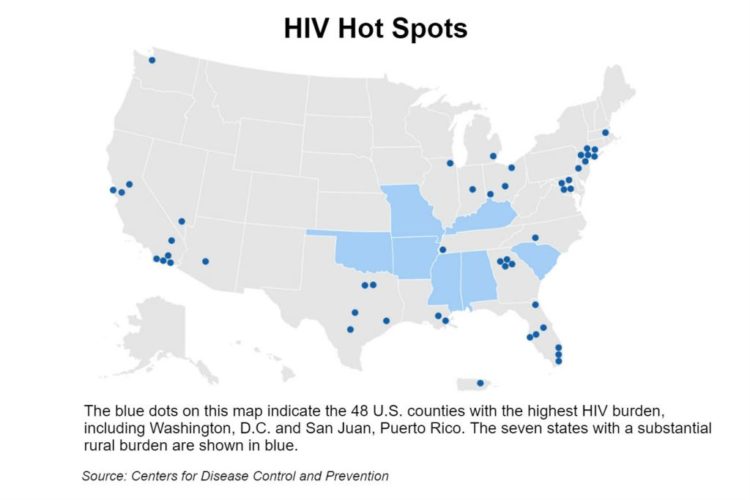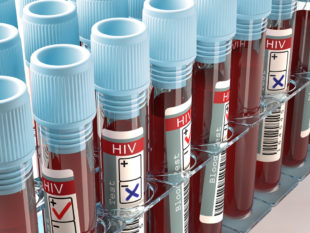The Trump administration last year laid out an ambitious plan to reduce new HIV infections.
Among 48 U.S. counties targeted for special federal help on HIV were four populous counties in metro Atlanta: Cobb, Fulton, DeKalb and Gwinnett.
It wasn’t surprising that those four counties were picked. Georgia has the highest rate of new HIV infections in the nation, and Atlanta is No. 2 among metro areas for rate of new infections.

But a year later, another virus rocked the economy of the state and the nation. Reacting to the fallout from COVID-19, a state plan for spending reductions projected taking a big chunk out of the budget of Georgia’s leading HIV services provider.
On Wednesday, a state Senate panel discussed spending cuts at the Georgia Department of Public Health. All state agences are in line for such cuts, which were required by Gov. Brian Kemp in response to revenue shortfalls amid the COVID-19 pandemic.

Citing the COVID crisis, Kemp initially mandated that state agencies identify 14 percent spending reductions in their budgets. But that figure that has recently been revised to 11 percent amid some better economic data.
With the new wiggle room, Dr. Kathleen Toomey, commissioner of Public Health, said she would like to restore the $1.5 million contract for Grady Health System’s HIV/AIDS program. That funding was set to be eliminated under the agency’s initial proposal for cuts.
Toomey urged the Senate Appropriations subcommittee on human development and public health to renew the contract to support Grady’s Ponce de Leon Center in Atlanta, which serves more than 6,000 patients annually.

Grady officials said a contract termination would lead to an increase in HIV in Georgia. The impact would also include reducing the state’s ability to respond to various infectious disease outbreaks in the future, Grady officials said.
The $1.5 million reduction would be a “devastating’’ blow to the Ponce de Leon Center, said Dr. Wendy Amstrong of Emory University, medical director of the Infectious Disease Program at Grady.
That cut, combined with matching federal funds, would deliver a financial hit to the Ponce Center of about $5 million, or more than one-third of the its overall budget, Armstrong told GHN on Tuesday.

“There would be no part of our clinic that wouldn’t be affected,’’ Armstrong said. “We would have to reduce the number of patients we serve.’’
The Department of Public Health – the main agency fighting the COVID-19 pandemic – targeted several important programs for cuts in its earlier budget proposal. The reductions include:
** $3 million from the Georgia Center for Oncology Research and Education (CORE) and regional cancer coalitions.
** $1.5 million from programs dealing with maternal mortality — a longtime problem in Georgia
** $1 million from programs to screen and treat maternal depression in rural and underserved parts of the state.
** $17.7 million from county boards of health.
Toomey on Wednesday, noting the new 11 percent target, urged the Senate panel to also consider eliminating furlough days for staff, and reducing the planned cuts to the boards of health and to CORE.
About more than HIV
During the pandemic, the Ponce Center has had to redesign its processes to keep patients and staff safe. “We have worked very hard to keep our clinic operational,’’ Armstrong said.
The Ponce Center provides several services besides primary care for HIV/AIDS. These include mental health services, women’s care, specialty care for conditions such as hepatitis C and cancer, addiction services, and nutrition and transportation help.

“We provide really comprehensive services,’’ Armstrong. “That’s why our patients do well.’’
The center is the leading medical provider for HIV-exposed newborns, caring for about 200 infants annually. Its center for children and youth is the largest standalone facility for pediatric and adolescent HIV care in the nation.
About two-thirds of patients have advanced, symptomatic HIV disease, or AIDS. Their treatment must continue so it can keep the virus at undetectable levels – meaning they cannot spread it.
African-Americans are disproportionately affected by HIV and represent 84 percent of the Ponce Center patients, Grady says. “Like COVID,” Armstrong said, HIV/AIDS “disproportionately affects our minority community.’’
Shelving the Ponce contract, Grady said, would also reduce the state’s ability to respond to infectious disease outbreaks.
That’s because the program runs a major training program for physicians fighting diseases such as COVID-19, Ebola and tuberculosis.

